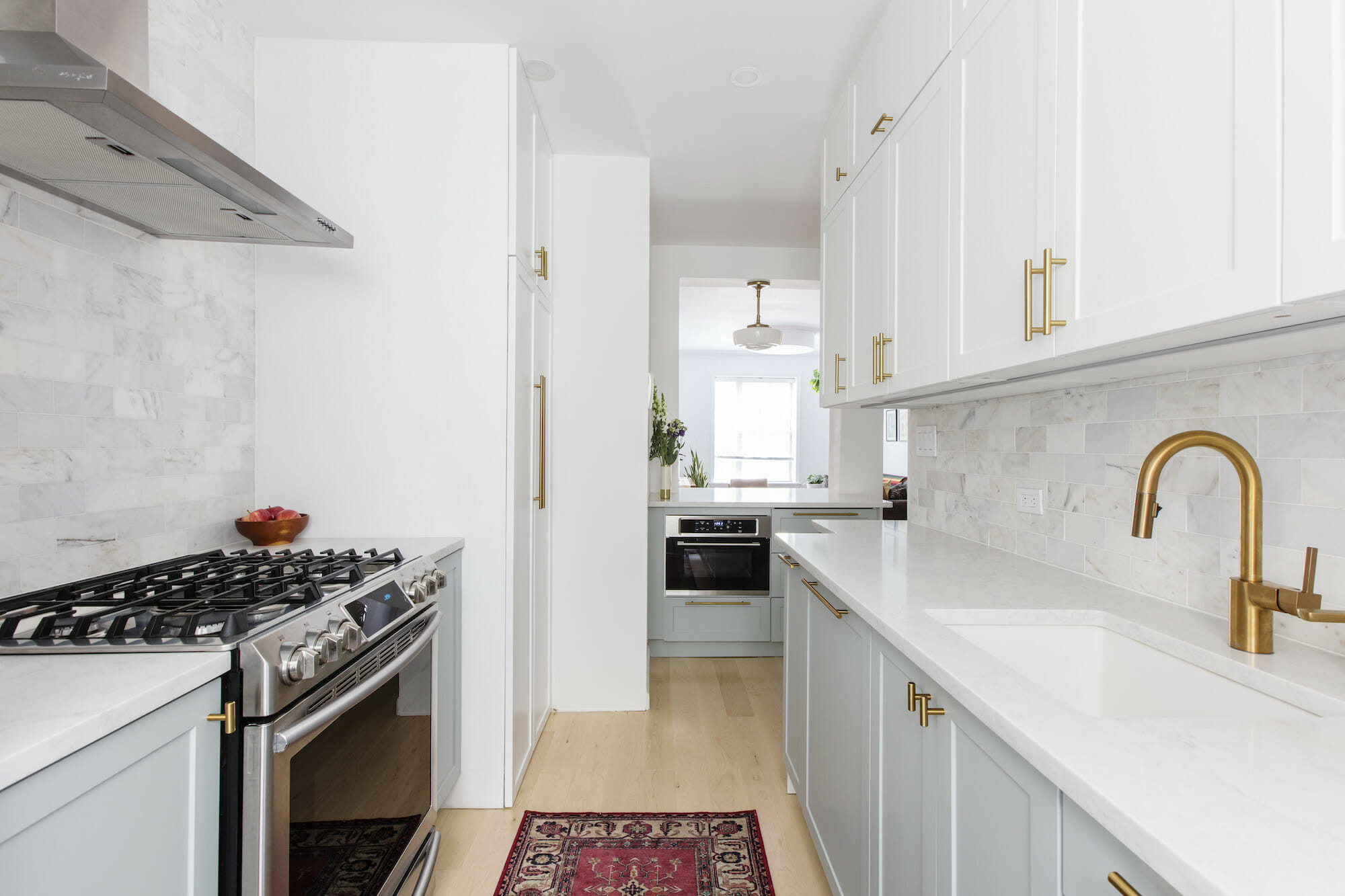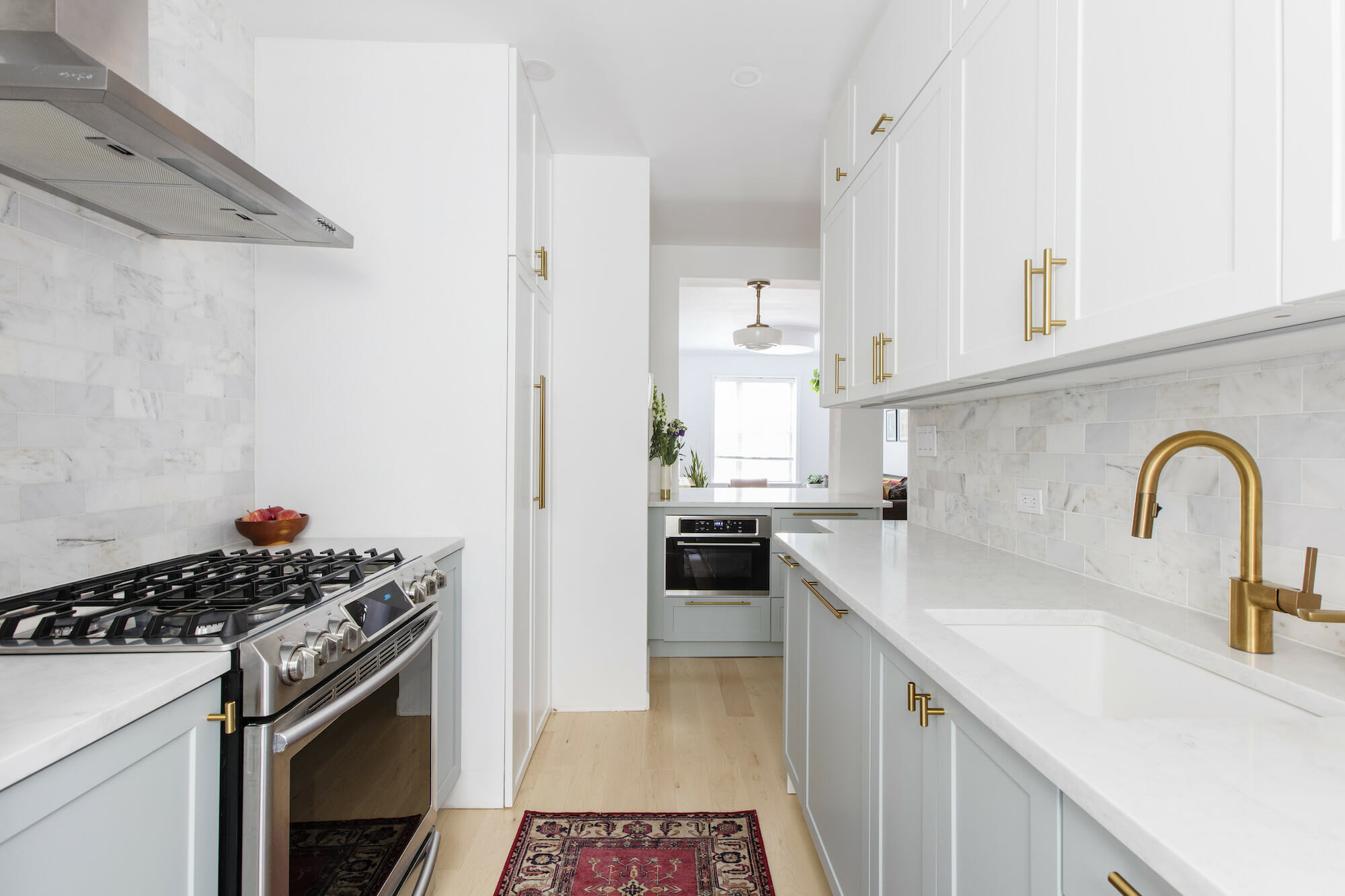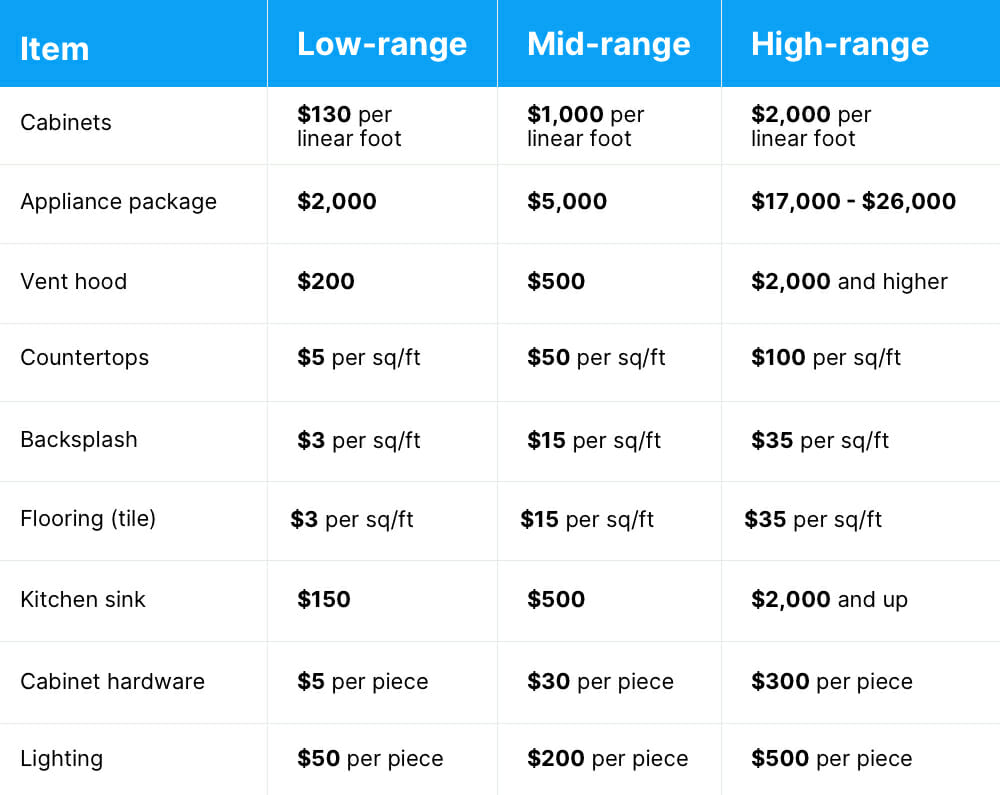2021 Kitchen Renovation Costs in NYC

Planning out costs for an NYC kitchen renovation? Here’s what you could spend on materials, labor, and permits.

(Above) Sweeten homeowner Gina + Andrew’s kitchen renovation
Dreaming of the kitchen you’ve always wanted is easy, but knowing how much it’ll cost is complicated. It’s useful to have a roadmap of the elements you could encounter in an NYC kitchen renovation to help you understand your options, as well as behind-the-scenes costs. Here, Sweeten offers an overview of NYC kitchen renovation costs so you can create a space that works perfectly for you.
Sweeten matches home renovation projects with vetted general contractors, offering advice, support, and up to $50,000 in renovation financial protection—for free.
From building requirements to permits and design, take a look at the average costs for renovating a kitchen in NYC, according to Sweeten renovations.
Minor, mid-grade kitchen renovation (meaning no layout changes and not moving plumbing or electrical) and includes materials such as cabinets and appliances: Starting at $29,522
Major, mid-grade renovation: Starting at $35,000—$40,000
Major, high-end renovation: Starting at $65,000—$75,000
Pro tip: Do not wait. The pandemic has caused a backlog in the supply of materials in many sectors. For homeowners interested in renovating, it’s smart to schedule and sign with a contractor to lock in your material prices. You’ll also want to book a start date on the contractor’s schedule. If you do wait, prices will only continue to go up and your material order starts at the back of a long queue.
Budget to high-end costs for kitchen appliances and finishes
Take a quick walk around any home appliance store, and you can start to get a feel for the obvious costs of a kitchen renovation. On the budget side are items sourced from big-box stores like Home Depot, Walmart, or IKEA. Prices increase if you choose to use their interior boxes but upgrade or customize the function or style, such as the door fronts. The middle range covers quality, longer-lasting products, and on the high end are highly customized, luxury brands, or imported items.
How much do materials for a kitchen remodel cost?
The chart below shows a range of pricing for various fixtures, materials, and finishes from budget, mid-grade to high-end below:
Cabinets: Budget – $130/linear foot, Mid-grade – $1,000/linear foot, High-end – $2,000/linear foot
Appliance package: Budget – $2,000, Mid-grade – $5,000, High-end – $17,000$26,000
Vent hood: Budget – $200, Mid-grade – $500, High-end – $2,000 and higher
Countertops: Budget – $5 per square foot (psf), Mid-grade – $50 per square foot (psf), High-end – $100 per square foot (psf) and higher
Backsplash: Budget – $3 psf, Mid-grade – $15 psf, High-end – $35 psf and up
Flooring (tile): Budget – $3 psf, Mid-grade – $15 psf, High-end – $35 psf and up
Kitchen sink: Budget – $150, Mid-grade – $500, High-end – $2,000 and up
Cabinet hardware: Budget – $5/piece, Mid-grade – $30/piece, High-end – $300/piece
Lighting: Budget – $50, Mid-grade – $200/piece, High-end – $500/piece

A note about cabinetry: In high-end kitchens that feature custom millwork, the cabinetry often accounts for a high percentage of both materials and labor costs. The starting point for basic custom cabinetry is $1,000 per linear foot. This applies whether you’re using minimalist, sleek cabinets with concealed hardware, or decorative cabinetry with custom visual details. However, many factors can affect this number—drawers are costlier than shelves, for example, and creative solutions such as Lazy Susans, pull-out pantries, specialized compartments, and soft-close hinges all increase costs. The cost and finish options of kitchen cabinetry work are very similar to custom millwork and built-ins.
Custom cabinets are not just for houses with lots of square footage; apartment owners with limited kitchen depth may also benefit by going custom. Cabinets with less depth can maximize tighter spaces, while more depth can accommodate larger tableware storage. These choices inherently require custom cabinet work because prefabricated cabinet options come in limited and fixed depth measurements. Read more about the difference between custom and prefab cabinets here
![]()
Budget for permits, design, and everything behind-the-scenes
In contrast to the visible costs, here are some mostly unavoidable behind-the-scenes budget items to keep on your radar.
1. ) Building requirements
Building requirements can play a significant role in dictating design and budget needs for apartment owners. These requirements can range from insurance coverage minimums, which limit your ability to work with professionals who aren’t carrying high-value insurance policies, to alteration agreements that require anyone doing any work in the building to have far-reaching coverage for problems they may never encounter, like asbestos removal or collapse scenarios.
Contractors who can afford to work in buildings with more extensive requirements tend to have higher operating costs and can meet higher insurance requirements, more stringent debris removal expectations, limited noise and hours-of-work requirements, and stricter parking rules. While there is no exact figure on this, you may see this translate into higher rates overall for teams that can meet those demands.
2.) City permits
Plumbing services: $2,000$3,500 and higher
Plumbing permits: up to $2,000 and as high as $5,000 per permit
Electrical permits: $900
Asbestos inspection: $500$1,000
Plumbing services can cost $2,000 to $3,500+ and plumbing permits (required by the City’s Department of Buildings for any plumbing work that exceeds a minor repair or a direct swap of a similar fixture) can run up to $2,000 and as high as $5,000 per permit. Adding outlets or doing electrical work may call for an electrical permit, which can run close to $900. You may also need an asbestos inspection, depending on the building’s requirements and your plumbing plans, which can cost $500 to $1,000
3.) Design
In the design stage, plan to collaborate with the experts you hire to create detailed drawings that account for all physical elements of the kitchen, including layout, plumbing, cabinetry and counter specs, lighting, and appliances. You should also select your backsplash, flooring, sink, and hardware during the design phase.
If you are considering major layout changes, such as removing walls, rerouting gas or plumbing lines, and rewiring electrical, you are looking at spending at least $32,000 for a basic kitchen gut. If you are considering this kind of transformative work, you’ll need architectural designs from a registered architect and to plan for the cost of permits, thorough building approvals, high insurance coverage requirements, and more involved management from a general contractor overseeing the project.
These “soft costs”—expenses critical to the success of the work but often invisible and unforeseen—can represent 15 to 35% of the renovation cost. Read more about layout changes here
4.) Demolition and site prep
In the site prep stage, significant behind-the-scenes labor is needed to ensure that your kitchen renovation maintains its value over time. Old materials and fixtures need to be pulled out and disposed of—this can be complicated on busy city streets with limited parking. Almost without exception, and especially in old buildings, your contractor will need to strip the walls and flooring to frame and level, respectively, before the installation phase. This step is critical and labor-intensive—and can easily average $4,000
If your home is new or the sub-floor is concrete, leveling needs may be minimal, but otherwise, you probably need to account for floor-leveling and new wall sheetrock or intensive plastering before any surface work can get going.
Exposing the existing conditions inside walls during this leveling and framing step will also allow your contractor to address plumbing or electrical issues before you hook up a brand-new appliance. You may find it necessary to replace all horizontal plumbing work to the building’s “stack” (the main vertical lines that run throughout the building), and run new wiring to head off plumbing and electrical problems that you may have unwittingly inherited.
Factor in costs that support the success and longevity of the work, including prep work to protect floors and valuables, which can add $600 to $900, and waterproofing steps, which can add $1,000. While these steps are labor- and cost-intensive, the work is critical for foundation alignment and infrastructure needed for the project, so consider them wise investments.
WATCH VIDEO:
5.) Installation
Last, but certainly not least, is the install. It’s essential to note that high-quality materials are only as good as the installation—if hinges are not properly aligned on drawers or cabinets, or if the shelving is not completely level, these faults will not only prevent your kitchen from aging well, they will also affect the immediate aesthetics of your space. Appliances are often installed by the store where you made the purchase (as a built-in cost or an added delivery/installation fee), while countertop suppliers often also manage the installation of that product. If it is not provided as a built-in cost, installation is usually subsumed under the “general construction” or “labor” budget line and handled by your general contractor.
6.) Behind-the-scenes costs
Overhead costs
General contractors always factor in a percentage of the project to cover overhead costs, including insurances, administrative support, and the inevitable costs of growing a business. Sweeten contractors range from two-men crews to much larger entities that employ dozens of staff (including designers, project managers, millworkers and laborers, bookkeepers, and operations staff). No matter the size of your contractor’s business, however, you will absorb some of the cost increases they bear from year to year, though not necessarily dollar for dollar.
Sweeten contractor Thomas explained that as a business grows, costs also go up. “Insurances increase yearly, and anything related to MEPs (mechanical, electrical, and plumbing) has also increased a bit as these subcontractors—especially plumbers—have seen an increase in their costs.” This is because the rules have become more stringent and there needs to be “more eyes on the project.” Additionally, he mentions, “Buildings are being more stringent on their [insurance] requirements which cause us to keep up with those needs.”
Costs of raw materials
While Sweeten contractors attempt to explore all avenues to stay competitive, it is an industry that is affected by trade. The prices you’re quoted at any given time may not be the same six months or a year from now. Prices on labor and materials fluctuate and this will be reflected in your overall quote.
For 2021, Sweeten general contractors are seeing wood materials as the main increase in costs. “These material costs have increased approximately 3x the amounts mainly due to Covid related issues, from what we have seen,” said Sweeten contractor Thomas. “These, in turn, relate to higher costs for plywood subfloors, kitchen cabinets, and other woodwork-related projects.”
One thing to keep in mind: “Every project is different depending on the complexity of the project, type of client, which trades will be involved, and how easy or difficult it will be to work in the particular building,” said Sweeten contractor Aaron.
Ready to budget for your NYC kitchen renovation costs?
You have a fair amount of choice in deciding what to spend on the material aspects of a kitchen renovation. However, some labor-intensive steps are instrumental to the work overall, no matter what you spend on materials. Knowing the real costs involved in an NYC kitchen renovation will allow you to better align your budget, avoid surprises, and get you that much closer to your dream kitchen.
![]()
Find out how long a kitchen renovation takes—and what’s involved—in our step-by-step guide and process timeline
Refer your renovating friends to Sweeten and you’ll both receive a $250 Visa gift card when they sign a contract with a Sweeten general contractor.
Sweeten handpicks the best general contractors to match each project’s location, budget, and scope, helping until project completion. Follow the blog for renovation ideas and inspiration and when you’re ready to renovate, start your renovation on Sweeten
The post 2021 Kitchen Renovation Costs in NYC appeared first on Sweeten.
